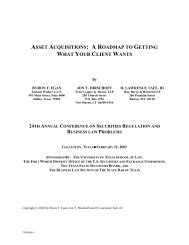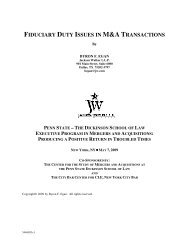Legal Implications of User Generated Content: YouTube, MySpace ...
Legal Implications of User Generated Content: YouTube, MySpace ...
Legal Implications of User Generated Content: YouTube, MySpace ...
Create successful ePaper yourself
Turn your PDF publications into a flip-book with our unique Google optimized e-Paper software.
III.Defamation and Other Speaker Related ActionsAlthough most prominent, and possibly most costly, copyright issues are not the only legal issuesrelating to UGC. One need only peruse the latest headlines to hear about the many cases being filedagainst UGC service providers.UGC websites allow users to essentially post whatever content they choose. Sometimes this contentcan be defamatory. The posting <strong>of</strong> allegedly defamatory information has prompted several lawsuitsagainst UGC website providers. For example in Carafano v. Metrosplash, the plaintiff sued a UGCwebsite operator for allegedly false content contained in a dating pr<strong>of</strong>ile that was posted by animposter. 42 Ultimately, the case was dismissed based on immunity provided by the CommunicationsDecency Act.Communications Decency ActThe Communications Decency Act (“CDA”) provides tort immunity to internetservice providers in certain circumstances. Section 230 <strong>of</strong> the CommunicationsDecency Act, provides: “No provider or user <strong>of</strong> an interactive computer service shallbe treated as the publisher or speaker <strong>of</strong> any information provided by anotherinformation content provider.” 43Thus, to qualify for section 230 immunity the defendant must meet the following:1. The defendant must be a provider or user <strong>of</strong> an “interactive computerservice.”2. The cause <strong>of</strong> action must seek to treat the defendant as a “publisher orspeaker” <strong>of</strong> information that is the subject <strong>of</strong> the lawsuit.3. The information must have been provided by another “information contentprovider,” i.e., a third party.Immunity under section 230 has been extended to more than defamation actions,including breach <strong>of</strong> contract, invasion <strong>of</strong> privacy, negligence, negligentmisrepresentation, and more. In fact, a majority <strong>of</strong> federal circuits have interpretedthe CDA to establish broad “federal immunity to any cause <strong>of</strong> action that wouldmake service providers liable for information originating with a third-party user <strong>of</strong>the service.” 44 This does not mean, however, that immunity will attach in allsituations in which a UGC service provider posts UGC content on its website. TheNinth Circuit recently held, in Fair Housing Council <strong>of</strong> San Fernando Valley v.Roommates.com, that an online roommate matching service was not eligible for CDAimmunity for user posted messages in response to pr<strong>of</strong>ile building questions about42 339 F.3d 1119, 1120 (9th Cir. 2003).43 47 U.S.C. § 230(c)(1).44 Perfect 10 II, 488 F.3d at 1118 (citing Almeida v. Amazon.com, Inc., 456 F.3d 1316, 1321 (11th Cir. 2006) (quoting Zeran v.America Online, Inc., 129 F.3d 327, 331 (4th Cir. 1997); see also Carafano v. Metrosplash.com, Inc., 339 F.3d 1119, 1122 (9th Cir.2003) (citing Batzel v. Smith, 333 F.3d 1018, 1026-27 (9th Cir .2003)).12
















